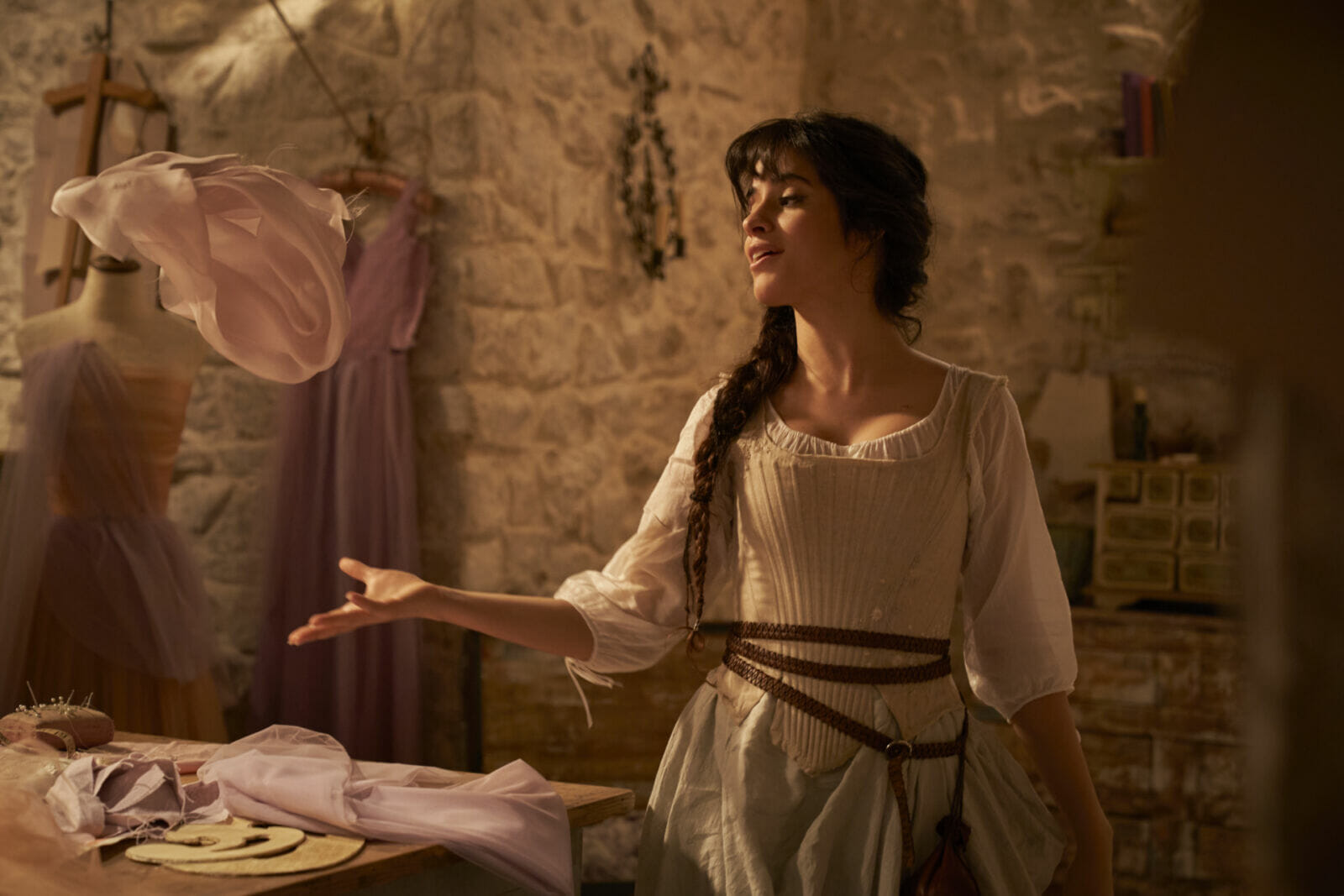This new musical retelling of Cinderella was allegedly James Corden’s idea, and I mean allegedly in the legal sense, because someone has to answer for this. It’s unclear why the film—produced by Sony and later sold to Amazon after its theatrical release fell through—even exists. It feels like one of those movies that a studio scrambles together to keep the rights to something, but Cinderella’s in the public domain. If anything, it could be a competitive reminder to Disney that they don’t own all the world’s fairy tales, which normally I’d be all for, but there’s the small problem of Cinderella being terrible.
Conceived by Corden (a late-night host who allegedly petitioned for late-night writers to be paid less) and written and directed by Pitch Perfect scribe Kay Cannon, Cinderella is billed as a modern, feminist version of the princess story. The plot’s been remixed a little: Ella (Camila Cabello), living in her stepmother’s basement, is an aspiring dressmaker, but her dreams of running a fashion business are quashed by the kingdom’s backward stance on women’s rights. The prince and his bachelorette ball are presented as a parallel story, just happening to coincide with Ella’s path to corporate ownership.
READ ALSO: 4 upcoming Marvel movie releases to watch in 2021
That Sony and Amazon would champion liberal feminism is no surprise—the movie’s message to young girls is “believe in yourself and the world will change for you”, a mindset that’s proven antithetical to progress time and time again—but it’s still a shame to see Ella’s potential weakened by an aversion to radical thinking. There’s a song at the beginning that sees Ella’s current and future selves singing to each other, which could be moving if her future self were more than her current self with a job. Cannon writes the character as confident, quirky, and sure of herself from minute one, so her pining for the future is less about growing as a person and more about getting to the part where she has what she deserves. Remember, kids: feminists don’t have weaknesses like human anxiety, they simply get sad at misogyny and cheer up when it goes away on its own.
Why spend time criticizing the subtext, though, when what’s on the surface is so ripe for mockery? Cinderella isn’t a musical so much as it’s your local radio station wallpapered over an old fairy tale. As with Cannon’s Pitch Perfect, the characters in Cinderella break out into ubiquitous pop songs, ranging from the theatrical “Somebody to Love” to the nothing-but-a-catchy-hook stylings of “Am I Wrong”. But the jukebox approach doesn’t vibe super well with the fantasy setting. Maybe it’d work if the creative team went all in with the pop angle, but instead we get weird half-measures, like when the ballroom musicians finish their “Seven Nation Army” / “Whatta Man” mashup and awkwardly transition to classical music. The movie is cringeworthy at best, appalling at worst—you’re unlikely to witness a scarier sight this year than James Corden scatting.
It’s like Cinderella was molded out of celebrity ignorance. Their attempt at modernizing the tone goes over worse than the music. It can be best summarized by the narrator introducing one of the stepsisters with the line “she cray”—or maybe when the word “toothsome” is defined by a younger character as “how old people say poppin’”. The movie leans so hard into “how do you do, fellow kids?” that it can’t even muster the earnestness of a Disney Channel original movie. That’s too bad, because it sure looks one: lifeless sets, green screen backgrounds, and CGI mice so plastic that it’s an improvement when one turns into James Corden.
The strangest thing about Cinderella is how it’s simultaneously so weird and so boring. One second, mice-turned-humans are obsessing over their ability to urinate from their “front tails”—the fact that male mice have male genitalia seems to have eluded Cannon—the next, the cast is shuffling around to some worn-out pop song while the camera watches on in a tired lull. Cannon’s first stab at directing a musical is bafflingly inert. The choreography and cinematography are lesser efforts: here’s a boring angle of dancers barely moving around; how about a close-up of an attractive face lip-syncing; cut to the singers standing in a horizontal line. The creative choices on display are either monotonous or inexplicable—there’s no in-between.
The only things keeping Cinderella from the bottom of the barrel are its performances, which are acceptable, and the soundtrack, which features songs that are algorithmically proven to provoke an emotional response. Otherwise, this is the kind of experience that justifies the Pitch Perfect protagonist in not liking movies at all.
★ (1/5)




